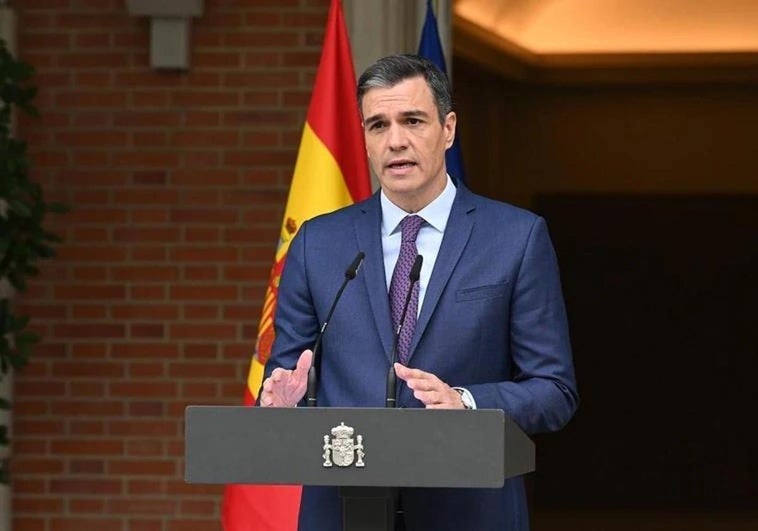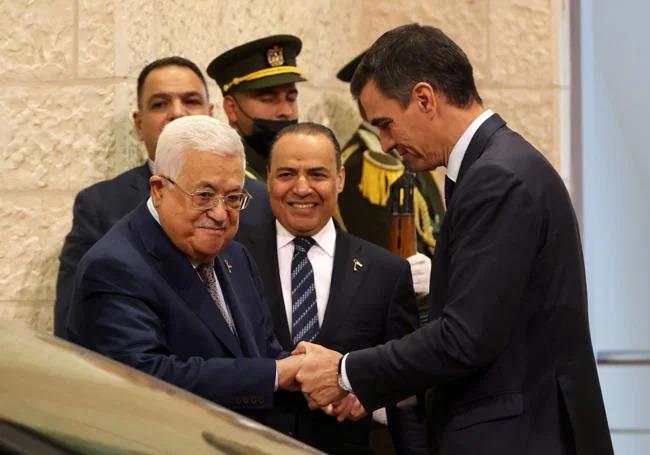
Sections
Highlight
Sections
Highlight

Spanish diplomacy took a historic step forward this Tuesday (28 May) with the recognition of Palestine as a state by the government, headed by Pedro Sánchez.
The prime minister appeared at 8.30am at the Moncloa Palace in a symbolic institutional gesture that seeks to give flight to a decision that is consistent with the unanimous agreement adopted in 2014 by congress in favour of the two-state solution - the Israeli state already in place and the new Arab state yet to be established. The agreement is a way of trying to put an end to almost seven decades of conflict in the Middle East, but which does not count the current war in Gaza, nor with the consensus of Partido Popular, the main opposition party, nor has the backing of the United States, or the two great powers of the European Union, Germany and France.
The prime minister, after the rebuffed reaction this recognition caused in Israel, including the withdrawal of its ambassador in Madrid, said this decision "is not against anyone" and that the "only objective" is to seek peace between Israelis and Palestinians. "We are not taking this decision against anyone, least of all against Israel, a friendly people we respect. This decision shows its absolute rejection of Hamas, which does not believe in the two-state solution. Spain condemned the attacks from the outset," Sánchez said.
With regard to the borders recognised by the council of ministers, Sánchez said the aim of the so-called two-state solution is for Palestine "to be viable", with the West Bank and Gaza connected by a corridor and with the capital in East Jerusalem.
Sánchez has rushed the move, persuaded that it is understood by most Spanish citizens, in the wake of the latest brutal wave of violence in the region and made it conditional only on trying to secure the cushion of broad European support. But nothing has stopped his plans and on Tuesday his resolution, endorsed by Ireland and Norway with a joint photo of their foreign ministers and Spain's José Manuel Albares in Brussels on Monday, will become a reality, opening a stage of hostility towards Israel whose consequences are yet to be seen.
The government's minority partner, Sumar, has welcomed the decision announced by Sánchez. However, deputy prime minister Yolanda Díaz said in an interview on TVE the recognition of Palestine "is not enough". In her opinion, and with the current situation, "the Spanish ambassador in Tel Aviv must be called to consort, we must join South Africa's demand and place an embargo on arms sales to Israel".
After the government selected 28 May as the date to recognise Palestine, Benjamin Netanyahu's government responded by recalling its ambassador to Madrid, Rodica Radian-Gordon. It has also prohibited the consulate in Jerusalem from providing services to Palestinian citizens, a diplomatic reprisal that is no small thing considering Spain has no plans to open an embassy in Ramallah (West Bank) and that its intention is to continue operating with its offices in the Holy City.
Although Tel Aviv has limited its response to these two measures, at least in the last six days since Sánchez made it official when he would speed up Spain's strategy in the region, what has been in crescendo has been the tone of the clash between the two governments. The unprompted remarks on Saturday by defence minister Margarita Robles on Armed Forces Day, accusing Israel of committing "real genocide" in Gaza - a terminology with profound humanitarian repercussions, and legal repercussions that had been reserved for Sumar and Podemos, that not even the prime minister or his foreign minister have used - provoked an angry response from the Hebrew embassy that same night. The embassy accused the Spanish representative of adopting "Hamas's false story".
.@sanchezcastejon, Hamas thanks you for your service. pic.twitter.com/Pkdp5diHRX
— ישראל כ”ץ Israel Katz (@Israel_katz) May 26, 2024
From there, the escalation has been led by Netanyahu's foreign minister, Israel Katz. He did so with a video posted on Sunday on his account on X, which emphasises the thesis his government has been putting forward for the past week that Sánchez's gesture "rewards" the terrorism of the Palestinian militia and the threat that his country will return "the damage" to whoever causes it.
The council of ministers will ratify Albares' words this Tuesday - "no one is going to intimidate us" - and will sanction his decision, which culminates the president's determination to tackle a conflict that already resulted in a tense meeting with Netanyahu in Jerusalem on 23 November. It was a face-to-face meeting in which Sánchez expressed his condemnation of the terrorist offensive launched on Israeli soil by Hamas on 7 October that triggered this latest crisis in the Middle East, but also showed him the Spanish government already saw the Israeli repression of Gaza as excessive.

In the eyes of the PSOE-Sumar coalition government, the 35,000 deaths, a significant number of them children, caused by the relentless entry of the Israeli army into Gaza in these seven months of war offer more than enough reasons to hasten the recognition of Palestine. A commitment that is now going to be sealed in the midst of the campaign for the European elections on 9 June and which has led the PP to wonder about the electoral intentions of the tenant of the Moncloa.
Alberto Núñez Feijóo has reiterated in parliament that he maintains the party where it was a decade ago, in the two-state solution. And this despite the pressures from sectors on the right and the departure of former president José María Aznar, who maintained, with more or less nuances, the historic line of Spanish diplomacy - from Adolfo Suárez to Mariano Rajoy via Felipe González (host of the Madrid peace conference that raised hopes of pacifying the region) and José Luis Rodríguez Zapatero - of acting as a factor of understanding between the warring parties in the Middle East powder keg.
What the opposition leader disagrees with is that Sánchez has decided to go ahead with his resolution, without consensus either in Congress or with the big EU countries, while warning that the measure, at this time, could harm the Palestinians and "empower" Hamas, considered a terrorist organisation by a large part of the West. The government is hoping for a sort of domino effect that will end up proving it right in its conviction that this step puts Spain on "the right side of history". For now, Spain will join Ireland, Norway and Slovenia on the list of 140 states in the world that have already recognised Palestine.
Publicidad
Publicidad
Publicidad
Publicidad
Esta funcionalidad es exclusiva para registrados.
Reporta un error en esta noticia

Debido a un error no hemos podido dar de alta tu suscripción.
Por favor, ponte en contacto con Atención al Cliente.

¡Bienvenido a SURINENGLISH!

Tu suscripción con Google se ha realizado correctamente, pero ya tenías otra suscripción activa en SURINENGLISH.
Déjanos tus datos y nos pondremos en contacto contigo para analizar tu caso

¡Tu suscripción con Google se ha realizado correctamente!
La compra se ha asociado al siguiente email
Comentar es una ventaja exclusiva para registrados
¿Ya eres registrado?
Inicia sesiónNecesitas ser suscriptor para poder votar.